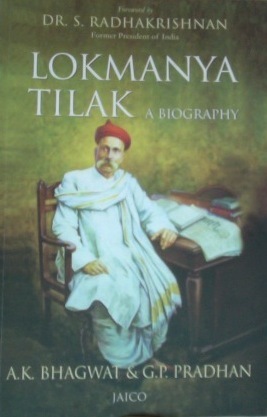My first impression of this book is that it is exhausting. The narrative is engaging and the content is inspiring. But the matter is exhausting.
 The exhausting nature has very little to do with the manner of the book; it has much to do with the life of Lokmanya Tilak. There is a military sense of discipline with which he lived a life and an inspiring sense of conviction with which he conducted it.
The exhausting nature has very little to do with the manner of the book; it has much to do with the life of Lokmanya Tilak. There is a military sense of discipline with which he lived a life and an inspiring sense of conviction with which he conducted it.
A biographer’s task must always be difficult, I believe. It is interesting to wonder where the task starts. Does it start when a biographer says, “Here’s a great life that I want to write about?” Or are there other dimensions? Biographers are perhaps naturally partial to the personality. Not always, but going by most biographers, they choose to present a dimensioned view of the personality.
The authors of Lokmanya Tilak: A Biography have struggled to exit the biographer’s trap. There is an inherent devotion to the person, yet they often exit their comfort zone to criticise the person, the action, and the events. While it may be easy to assume that the book is an assemblage of the public life and presentations of Lokmanya Tilak, there’s more. It isn’t obvious at time, but it exists. There’s support from the authors to help understand the life in specific contexts. The presentation, unwillingly, I felt, is non-linear for the most part. But this device has been used to good effect. The obvious glorification of a great leader is absent; it is possible to see a person, bereft of the associated podium. The book is rooted in data, references, and statements; which are often interpreted but not embellished.
Indian history deserves a parallel narrative to the one that exists. This is one of the few books that will be a leader in that parallel. The Indian history narrative suffers from periodical amnesia; meaning that it chops off periods in Indian history to focus on popular and sponsored segments that capture our imagination. The chopping-off is due to certain sustained political and social reasons. Irrespective, this book, notwithstanding the tint of glasses that we wear, is an important contribution. Somewhere in the book, Lokmanya Tilak says:
Do not be satisfied with the paltry service rendered by a person like me. The national work before us is so wide and so essential that all of us should strive for it with much greater determination and enthusiasm. You cannot postpone the work. Our mother land challenges us to go after this and I do not think her sons will refuse the challenge. But I would urge upon you to sink all your differences and be ‘national gods.’
The context of the era is expansive, and perhaps even timeless. It is not limited to Lokmanya Tilak, even while being centric to him. Through the life of Lokmanya Tilak, the authors make statements that are relevant today. And only your personal awareness will question you, and therefore exhaust you. If you choose to pick this book, be ready for an assault on your mind and heart. It’s an adventure that you will cherish in spite of the questions you will end up asking yourself.
The balance, texture, and presentation of the narrative is what I enjoyed the most.